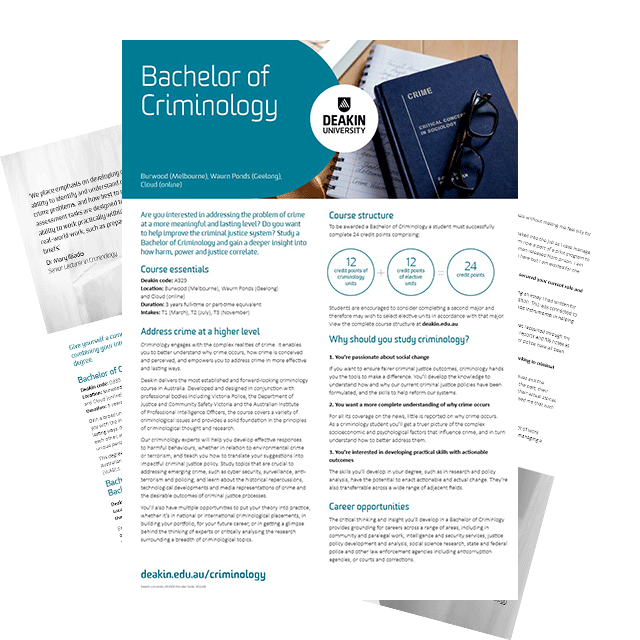Course overview
Deakin’s Bachelor of Criminology/Bachelor of I.T. Security is the only degree of its kind in Australia. It brings together two independent degrees in criminology and I.T. security into an attractive four-year combined course. The course will provide you with skills in securing data and data communications, as well as investigating, analysing and providing solutions to computer crime. The course assists you to attain the knowledge required to become a Certified Information Systems Security Professional.
Combining IT security with criminology covers a wide range of topics concerning the meaning of crime; different forms, causes and consequences of crime; and the different institutions and processes developed for preventing and controlling crime. You will be provided with broad theoretical and applied knowledge and skills in relation to policy development, policing and security, and related fields. Topic areas include crime, justice, security and surveillance.
You should consider this degree if you are interested in pursuing a career in criminology or IT security, and particularly the many areas where criminology and IT security overlap (such as in relation to cyber-crime and cyber-security).
You will have the opportunity to complete the Criminology Practicum in your final year of study, a unit that brings the professions to the classroom (including online via the ‘cloud’) with practitioner-driven seminars, activities bridging theory and practice, and the development of an e-portfolio that can be used for employment or career development.
In line with Deakin’s commitment to providing flexible study options, you can choose to study the Bachelor of Criminology/Bachelor of I.T. Security full time or part time, at Waurn Ponds (Geelong) or via Cloud (online) mode. All subjects provide considerable online activities.
You will also have the opportunity to significantly fast-track your studies using Deakin’s trimester system.
Read MoreKey dates
Direct applications to Deakin for Trimester 2 2025 close 22 June 2025
Direct applications to Deakin for Trimester 3 2025 close 26 October 2025
Current Deakin Students
To access your official course details for the year you started your degree, please visit the handbook
Course information
- Award granted
Bachelor of Criminology/Bachelor of I.T. Security
- Year
- 2016 course information
- Deakin code
- D380
- CRICOS code?
- 083991B
Course structure
Criminology: Students must complete 16 credit points of study from the Faculty of Arts and Education including a minimum 12 credit points of ACR coded units, including the core units of ACR101, ACR102, ACR201, ACR202, ACR301, and ACR302.
I.T. Security: Students must complete 16 core units# of SIT coded units plus SIT010 Safety Induction Program (0 credit point compulsory unit)
# Students undertaking D380 are not required to undertake SIT306.
See course entry for Bachelor of Criminology (A329) or Bachelor of I.T. Security (S334)
Levels 1, 2, 3 & 4
Level 1
Trimester 1
Plus one (1) elective unit
Trimester 2
Plus one (1) elective unit
Level 2
Trimester 1
Trimester 2
Level 3
Trimester 1
Plus one (1) unit from the following:
Trimester 2
Plus one (1) elective unit
Level 4
Trimester 1
Plus two (2) elective units from the following
Trimester 2
*ACR210, ACR211 are offered in Trimesters 1 and 3 in alternating years; Trimester 1 2016, 2018, Trimester 3 2017, 2019.
** ACR212, ACR213 are offered in Trimesters 1 and 3 in alternating years; Trimester 3 2016, 2018, Trimester 1 2017, 2019.
For course map click here
Course Map
Intakes by location
The availability of a course varies across locations and intakes. This means that a course offered in Trimester 1 may not be offered in the same location for Trimester 2 or 3. Check each intake for up-to-date information on when and where you can commence your studies.
From 2017 this course will be retitled Bachelor of Criminology/Bachelor of Cyber Security
Deakin splits the academic year into three terms, known as trimesters. Most students usually undertake two trimesters each year (March-June, July-November).
Equipment requirements
For information regarding hardware and software requirements, please refer to the School of Information Technology's website, www.deakin.edu.au/information-technology/students or telephone 03 9244 6699.
Entry requirements
Scholarship options
A Deakin scholarship could help you pay for your course fees, living costs and study materials. If you've got something special to offer Deakin - or maybe you just need a bit of extra support - we've got a scholarship opportunity for you. Search or browse through our scholarships
Apply now
Applications for Trimester 1, 2026 open in July. Each year, thousands of students prepare for uni with the help of Deakin support services. We offer a huge range of support, including one-on-one consultations, webinars, online resources and events throughout the year.
To apply, create an account in the Deakin Application Portal, enter your personal details and education experience, upload supporting documents and submit. Need help? Play this video, or contact one of our friendly future student advisers on 1800 693 888 or submit an online enquiry.
Pathways
View pathways into the Bachelor of Criminology/Bachelor of Cyber Security with our pathways finder.
Alternative exits
- Bachelor of Criminology (A329)
- Bachelor of Cyber Security (S334)
Contact information
Arts and Education Student Services and Enrolment Enquiries
Waurn Ponds (Geelong)
Tel 03 5227 1359
artsed@deakin.edu.au
Burwood (Melbourne)
Tel 03 9246 8100
artsed@deakin.edu.au
Cloud (online)
Tel 03 5227 1359
artsed@deakin.edu.au
Faculty of Science, Engineering and Built Environment
School of Information Technology
Tel 03 9244 6699
sebe@deakin.edu.au
www.deakin.edu.au/sebe/it
Careers
Want a degree that’s more than just a qualification? Our industry connections, world-class facilities and practical approach to learning are just some of the reasons why Deakin students graduate confident and ready to thrive in the jobs of tomorrow.
Professional recognition
The Bachelor of I.T. Security part of this double-degree is professionally accredited with the Australian Computer Society (ACS).




